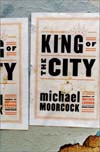

Written by Michael Moorcock
Published by William Morrow
Michael Moorcock has the dubious distinction of being not one of England's best living novelists, but two. There is the Michael Moorcock that gave us Hawkmoon, Corum, and the infamous Elric of Melniboné, doomed heroes all, strugging against their world's slide into stagnant law or shredding chaos. That Moorcock has given us more than 50 novels about the mythopoetic Eternal Champion, a living embodiment of Campbellian archetypal myth, and that Moorcock is widely regarded as one of the finer sci-fi/fantasy authors to ever ply the trade. On the other hand is the "literary" Michael Moorcock, whose Mother London got short-listed for the Whitbread Prize, only to lose out to Salman Rushdie's titanic Satanic Verses. That Moorcock has various newspaper critics and literati gasping at the Moorcock's "emergence" as a great novelist (nevermind you that he's been publishing steadily for decades).
Now, to be completely frank, I've always been partial to the first Moorcock - the man who gave us the Eternal Champion, and a sword-swinging albino with doomed relationships waging war with the very forces that spun his world into being. He was a risk-taker in an era when fantasy heroes were universally square-jawed and clean-cut, never sickly cynics with a wide misanthropic streak and a willingness to bargain with demons. Moorcock has produced more quality work in the genres of sci-fi and fantasy than nearly any of his contemporaries.
Despite this preference of mine, however, it seems that latter-day Moorcock has become a bit concerned about his authorial legacy and his place in the world of contemporary fiction, and has thus turned his attention increasingly to "literary" fiction. While Mother London managed to set the establishment all a-twitter, I found it inferior to a great many of his so-called "lesser" works, if merely because it had the distinct feel of a man trying too hard to be "legitimate." And tragically, King of the City suffers all the same problems and then some.
Denny Dover is a sleazebag tabloid photog, prattling on endlessly about the days when he was a real photojournalist, before he sold out and started creeping around in bushes to get pictures of Lady Di. Unfortunately, after a fateful car crash kills the People's Princess, Denny and his ilk are the new social pariahs, and none of his previously hungry publishers want to touch any of his ill-gotten candids of the rich and famous. So of course Denny swears at the fickle nature of the culture, never once considering it a possibility that what he does is despicable. But having run afoul of public opinion, he finds himself on the outs, and begins to dwell on his past, creating an seemingly-endless series of flashbacks that detail his life from the 1970s to present.
At a glance, the premise of the book has promise. Unfortunately, the end-product doesn't come close to delivering. Denny remains pretty much annoying and reprehensible throughout, despite all his railings against the ills of society. It's hard to take a social critic seriously when he's more than willing to be part of the problem, so long as it pays. The book essentially revolves around the fact that Denny is in love with his cousin, who married a man that was once their friend, but is now a rapacious businessman with more money than God and a desire to remake the world in his own corporate image. So Denny whines, and points out social problems, and whines some more, and remembers his childhood, and whines again, while cursing his childhood companion for becoming a tie-wearing bastard.
The flashback construction, while potentially a good way to cover lots of history without messy expository dialogue, turns into a too-convenient way for the author to get sidetracked in meaningless minutiae of the scenery and secondary characters, never taking enough time to pull back and fashion anything resembling a coherent plot. To be fair, Moorcock's prose is a blast to read - he's a gifted wordsmith - but at the end of the day, it's hard to really see where the hell he thought he was going with most of this stuff, 'cause he sure as hell never gets there.
Doc's Diagnosis: If you're a fan of Moorcock's fantasy, tread carefully, because this isn't really the same cup of tea whatsoever. On the other hand, if you liked Mother London, this might be your speed. Looks to me like Six Characters In Search of a Coherent Plot, but YMMV. A great rambling mess of a book that needed serious tightening up and never got it.
Grade: C-
Review submitted by Doc Ezra
Discuss the review in the Needcoffee.com Gabfest!
Greetings to our visitors from offsite!
Stick around and have some coffee!